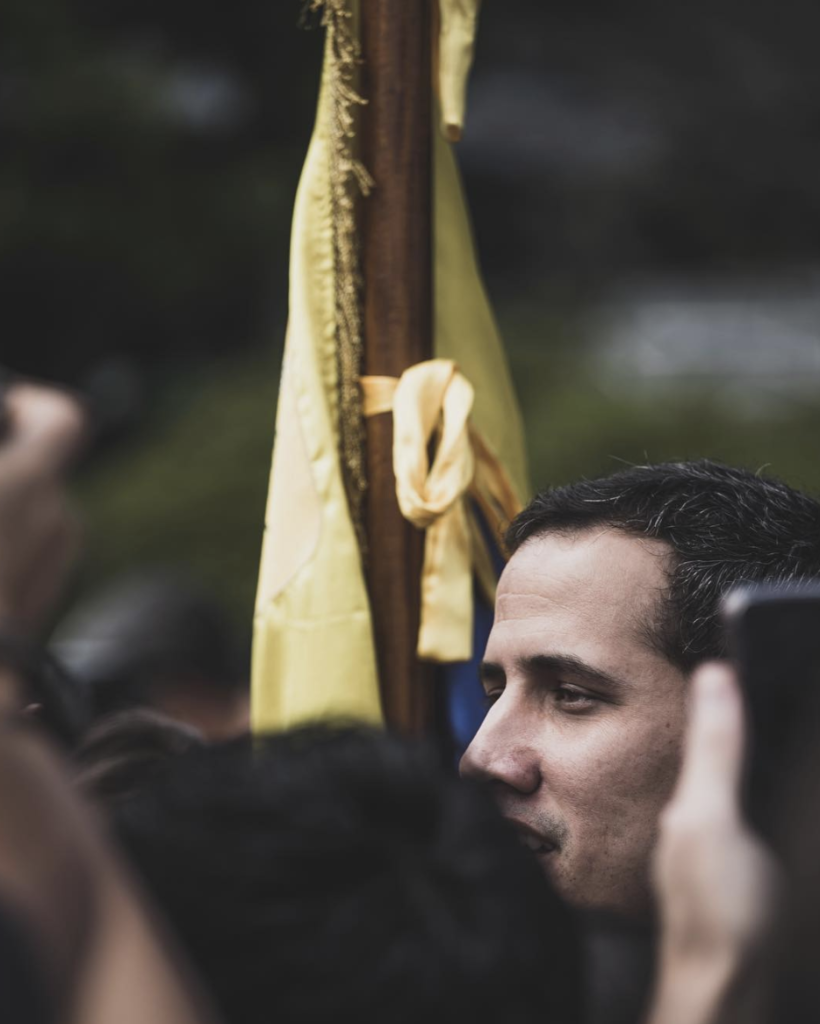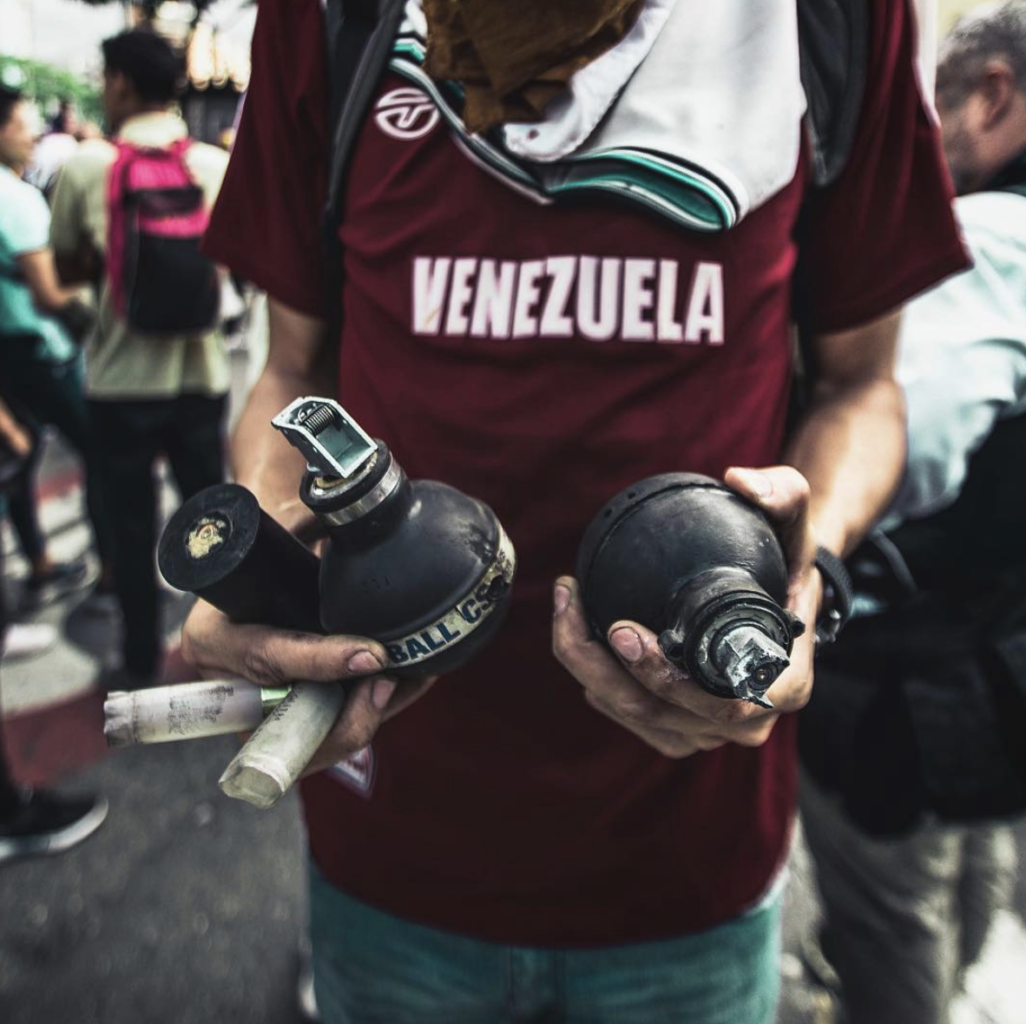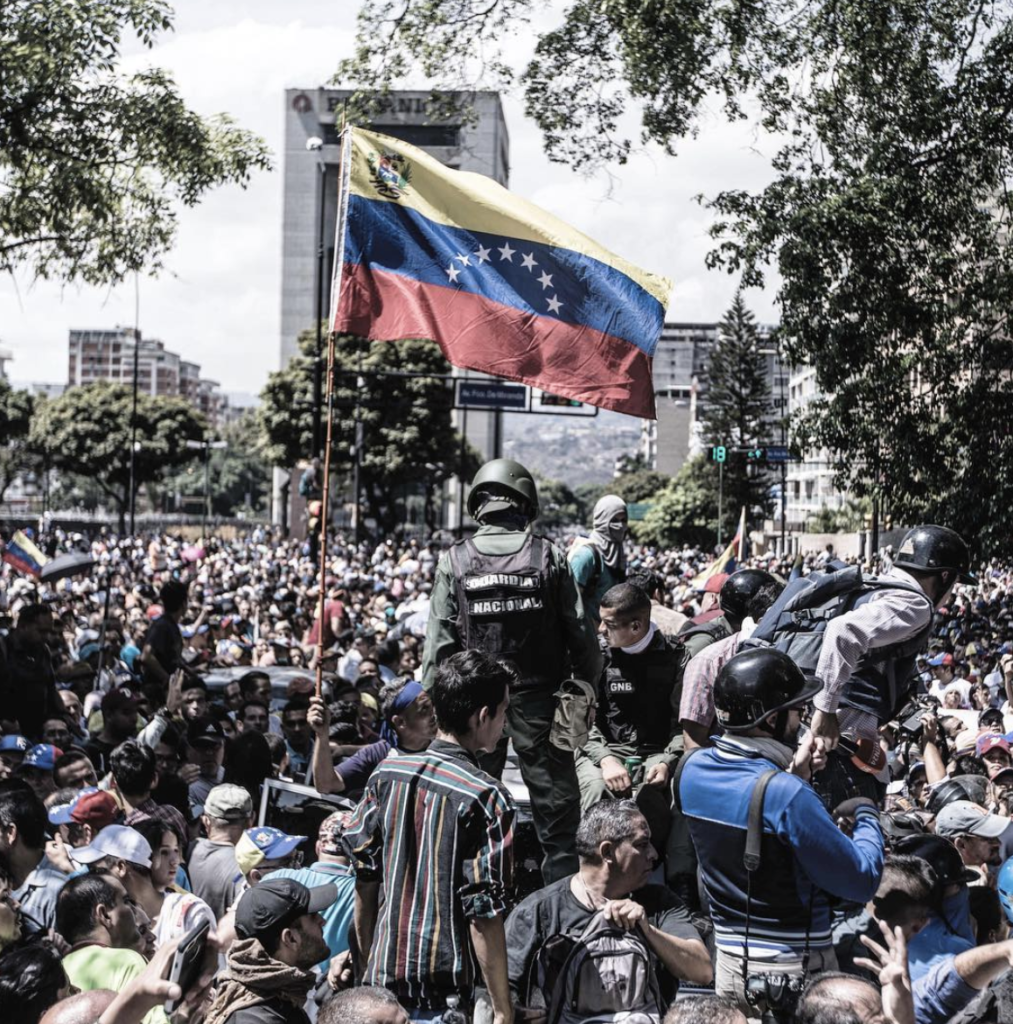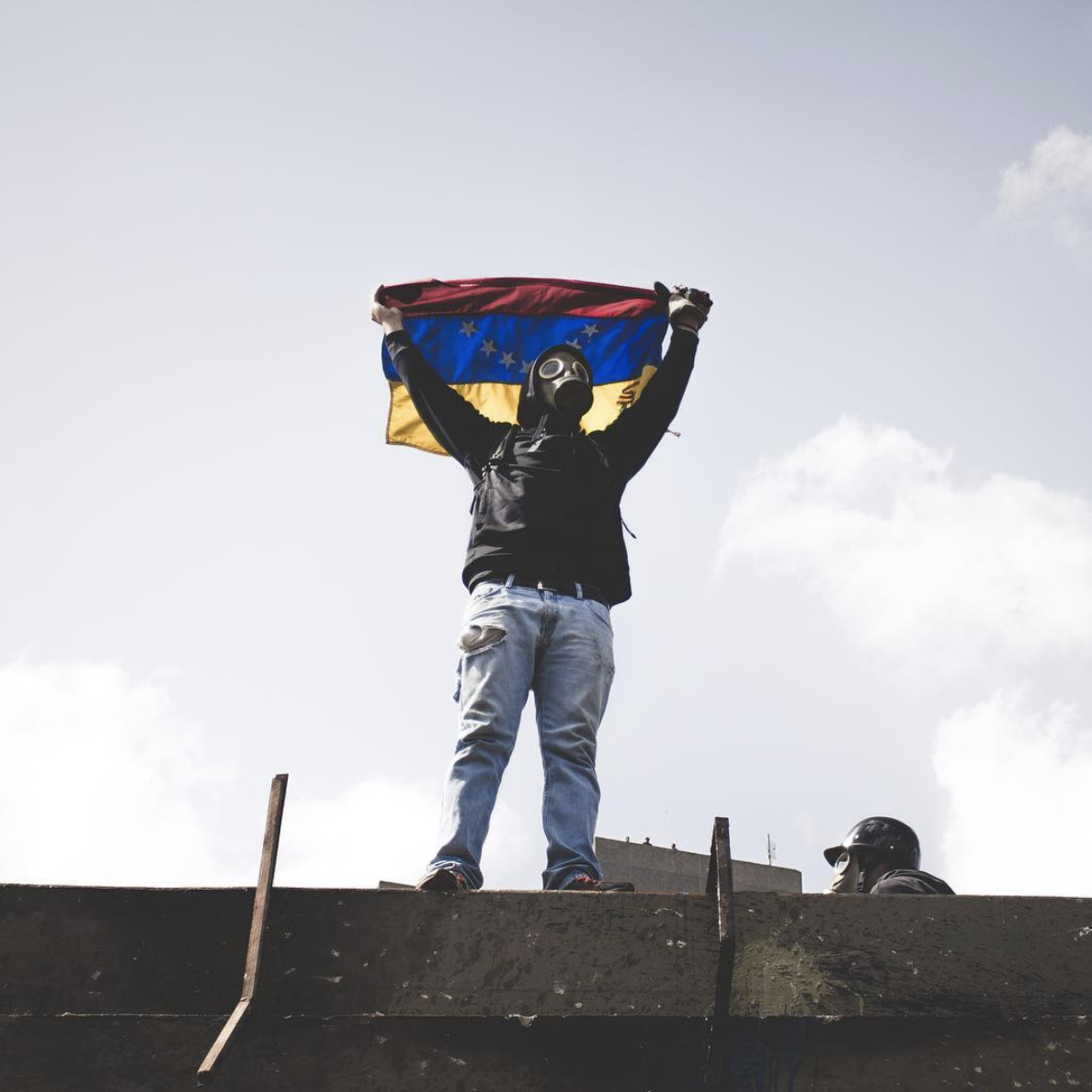Beyond the surface of political turmoil in Venezuela lies an immense and catastrophic humanitarian crisis — a disaster that is devastating the lives of the country’s citizens, including the New School community members who call the South American nation home.
“I think the best way to explain it, and it’s not really a way of explaining it, [is that] Venezuela is literally no man’s land. There’s no law. There’s so much corruption,” Mishka Capriles (Lang ‘18) told the New School Free Press by phone from Spain, where she now lives. “The economy doesn’t make any sense. Inflation is soaring, so with what people make economically in their job, they can’t pay anything, so they resort to alternative jobs. There’s so much corruption because there’s so much poverty; there’s so much poverty because there’s so much corruption. You don’t know which one came first.”
The crisis in Venezuela has been declared a humanitarian one by several countries and non-governmental organizations around the world, including nations like the United States, Canada, Peru, and Spain and NGOs like Amnesty International, but more importantly by Venezuelans themselves. For Venezuelans both in the boundaries of their nation and around the world seeing refuge, survival is the priority. Political corruption, restricted access to food and other necessities, poor medical care, horrific violence, and other outcomes have detrimentally affected the quality of life for Venezuelans at home and abroad.
Maduro’s government is not the only player in this crisis: the United States continues to economically sanction Venezuela in efforts to “further squeeze the finances of the government led by President Nicolás Maduro,” according to the New York Times, and the opposition has continually tried to destabilize Maduro’s government by burning food and supplies.
‘The First Time We Were Robbed’
When Hugo Chávez was first elected president of Venezuela in 1998, he ran on the principle of helping the poor and listening to the voices of the disenfranchised. But by the fifth year of his presidency, according to the World Bank, 54% of the nation’s people were living in poverty, leaving Venezuelans with Chávez’s empty promises. When Chavez died in 2013, Nicolás Maduro was elected that April. Maduro beat Henrique Capriles (no relation to Mischka), the Governor of Miranda, in the presidential election. Capriles and his supporters demanded a recount, according to the Guardian, but the request was not granted.
“I think that the first time we were robbed of elections was immediately after Chávez died,” Daniel Rodriguez-Navas, an NSSR assistant professor of philosophy who is Venezuelan, told the Free Press in an interview.
Maduro has been in office for six years. International Monetary Fund data shows that Venezuela’s gross domestic product has drastically plummeted from 1.3 percent in 2013 to -25 percent in 2019. The country’s poverty rate soared to almost 90 percent in 2018 from just under 50 percent when Maduro first became president, according to a report by researchers at Andrés Bello Catholic University, one of Venezuela’s largest private colleges.
Ricardo Isea, an NSSR political philosophy and history PhD candidate, wrote in a 2017 Public Seminar essay that during Chávez’s presidency, “the Venezuelan economy [was] more dependent than ever in the world capitalist system. Oil dependency went from around 70 percent of the total value of exports in 1999 to 97 percent in 2016. National production, including food production, was progressively substituted by imports, financed through petrodollars and an artificially cheap foreign currency.” He explained that “corruption reached levels never recorded in the history of the country. But when oil prices started to collapse in 2014, the party was over.”
Since Maduro has refused to acknowledge there is a crisis in Venezuela, citizens haven’t been able to obtain necessities that the government regulates and imports, from fresh produce to hygiene products like tampons.
“Maduro is an animal. He is what we call Satan on Earth. He is the reason that my beautiful country is destroyed,” said Bettina Lobo, a fourth-year musical theatre major at the New School. She spent 18 years of her life growing up in Caracas, and said that she’s visited Venezuela once a year since starting college.
‘Illegitimate and Lacking Credibility’
Maduro faced a political challenge — and challenger — this time last year. On May 20, 2018, Venezuela’s National Electoral Council (CNE) held a premature election that re-elected Maduro as president of Venezuela. The election marked the lowest voter turnout in presidential elections of all time in Venezuela’s history, as Maduro’s main opposition boycotted the election.
Days prior to the election, the United States, Spain, and most of the Lima Group, an alliance of Latin American countries and Canada established to end the crisis in Venezuela, condemned the election, calling it “illegitimate and lacking credibility.” News outlets including the New York Times, Washington Post, Guardian, and NPR reported that the CNE was accused of suppressing votes to favor Maduro.
Interestingly, the CNE has ties to the New School: It’s current president graduated from NSSR.
Tibisay Lucena is the president of the CNE, which is responsible for organizing and regulating elections on both national and local levels. She was first elected in 2006 and re-elected for a second term in 2014; her tenure will finish in 2021. Lucena’s biography on the CNE website states that she received her PhD, thesis pending, from NSSR. The New School’s registrar office confirmed to the Free Press that Lucena earned a Master’s degree from NSSR.
The aftermath of the controversial May 2018 election introduced the world to Juan Guaidó, the then-president of the National Assembly. In the months since the CNE declared Maduro’s reelection, the U.S., European Union, and Lima Group representatives refused to recognize Maduro as the legitimate president. Instead, they recognized Guaidó as the interim president of Venezuela. The Venezuelan constitution states that in case of an unfair election, the president of the National Assembly takes over as acting president.

On April 30, 2019, Guaidó took to Venezuela’s streets with activists and a small group of armed soldiers to protest, calling for the military to rise up against Maduro. The uprising was unsuccessful.
Venezuelan Minister of Communication and Information Jorge Rodríguez commented on the situation on Twitter. “Maduro’s government was confronting a small ‘coup attempt’ led by military ‘traitors’ backed by right wing opponents,” he wrote, according to the Guardian.
‘People are Being Violently Repressed’
Over 3.4 million Venezuelans have fled Venezuela. By December that number will grow to 5.3 million, according to the UN Refugee Agency. That projected number would account for nearly 16 percent of Venezuela’s total population.
According to the United Nations Security Council (UNSC), an estimated seven million Venezuelans are currently in need of humanitarian assistance. Venezuelans inside and outside the country have resorted to drastic behavior to maintain their basic needs and a simple sense of control.
“People are dying because they get ill and there’s no hospital where they can get care. Babies are dying because incubators go off when the power is shut down. It’s a scarcity of goods. People are being violently repressed. People are being taken to prison and tortured,” Rodriguez-Navas said.
“I have to send my grandma her pills because she won’t be able to find them there,” Capriles said.
She said that her former boss has tried to shield his children from the trauma of the crisis. “He was telling me about [how] he and his wife have to make up games: Showering in the dark, or lantern [at] night. Trying to help their kids not realize what’s going on — why they don’t have water, why they don’t have food, why they don’t have any electricity,” Capriles said.
“My sister only gets 15 minutes of water daily in her building, and you have to take a shower, do the dishes, and do the laundry,” Lobo said. “And she’s one of the lucky ones.”
‘The Future No Longer Exists’
Inflation has contributed to civilians’ jeopardized safety. The annual inflation rate in Venezuela has risen to over 1.6 million percent as of March 2019, according to TradingEconomics. The inflation rate, according to the IMF, is expected to reach 10 million percent this year.

In a damning report entitled “This Is No Way To Live,” the human rights organization Amnesty International determined that Venezuela is one of the most violent countries in the world due to the state’s use of “disproportionate force, including lethal force, on the pretext of ‘combating crime.’”
“My sister was kidnapped. She was held at gunpoint, they took her in their car, and that was a two-hour kidnapping situation. That’s the thing. It’s normal that your family is going to get kidnapped,” Lobo said. She added that other family members had also been kidnapped. “They just want money.”
She explained how the violence in high schools and universities across the country led to another disruption of everyday existence. “I would have three months without classes during high school because of the strikes,” Lobo said. “You just grew up used to it. That was our normal.”
“Think of people in different generations. My mother is 70 years old. My mother is a very meticulous planner. We were never particularly wealthy, we were never particularly poor, but she planned her life, her future,” Rodriguez-Navas said. “The future no longer exists for her. She can’t have the future that she always planned for. And she’s kind of had to latch onto that for the past 10, 12 years. This conversation is something we always have in the family.”
“The messages I get from my friends who are living there are so depressing. Psychologically, they’re affected. It’s crazy. Their messages are like, ‘I’m going crazy, this feels like they’re killing us, they’re manipulating us. I’m not sure if the light goes out because the infrastructure sucks and they have no way to provide power to us or they’re playing with our brains and trying to make us go insane,’” Capriles said.
‘They Need Help. And That Should Be the Priority’
When it comes to the debate surrounding foreign involvement in Venezuela, the priority for the Venezuelan people remains unchanged: they want to survive and need to live safely and peacefully.
“By default, I am against all sorts of foreign intervention. It’s very easy for me to say that here, sitting comfortably in my Union Square office. People are leaving Venezuela by foot travelling hundreds of miles, leaving everything. They are carrying suitcases. They are the ones who get to decide,” Rodriguez-Navas said. “I don’t need to fly to them and ask them what they want in order to know what the Venezuelan people want. The Venezuelan people want for this to be over, however it happens.”
On Feb. 23, 2019, Colombia and Brazil sent trucks carrying food and medical aid supplies to Venezuela. Supporters of the aid were met with active resistance from Maduro’s militia. They were tear gassed and shot at with rubber bullets. Four people were declared dead and nearly 300 were wounded. Three of the trucks carrying aid caught fire as they approached the border checkpoints on two bridges that connect Venezuela to Colombia. Anti-Maduro protesters were recorded throwing Molotov cocktails at the trucks, in deliberate attempts to destabilize the government.
Venezuela is accepting aid from all non-U.S. backed countries.

As of April 16, 2019, humanitarian aid from the Red Cross was delivered to Venezuela, according to Reuters. The shipment included a total of 14 power generators, 5,000 liters of distilled water, and three surgery equipment kits aimed to serve roughly 10,000 patients.
The U.S.’s involvement in oil-rich Venezuela has sparked debate. Is the U.S. sending aid to the country for its own gain? Are the Venezuelan people getting what they want in this dire time of need?
“We accept everything that the United States government has given to us. I mean I’m not a Trump fan at all, but I am a fan for what he’s doing for my country,” Lobo said.
Jeffrey C. Isaac, a political science professor at Indiana University, wrote in a January 2019 Public Seminar column that “the Trump administration is surely using this crisis for its own purposes. This ought to be loudly criticized, and moves toward a U.S. military intervention ought to be strongly opposed.”
When asked about the debate surrounding the intentions of America’s involvement in Venezuela, Rodriguez-Navas stated that “the priority should be the Venezuelan people.”
“I don’t want to say ‘we’ because I think it would be disrespectful,” he said. “Because I’m not suffering as much as the people that are in Venezuela right now. They need help. And that should be the priority.”







